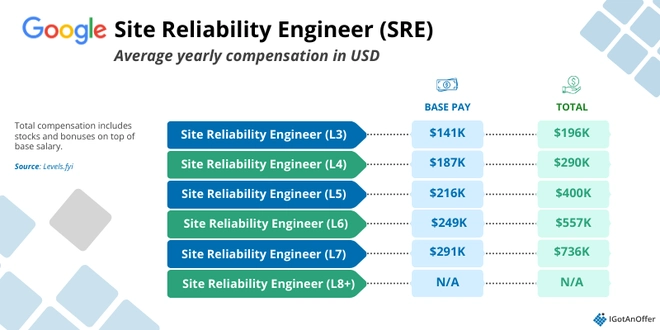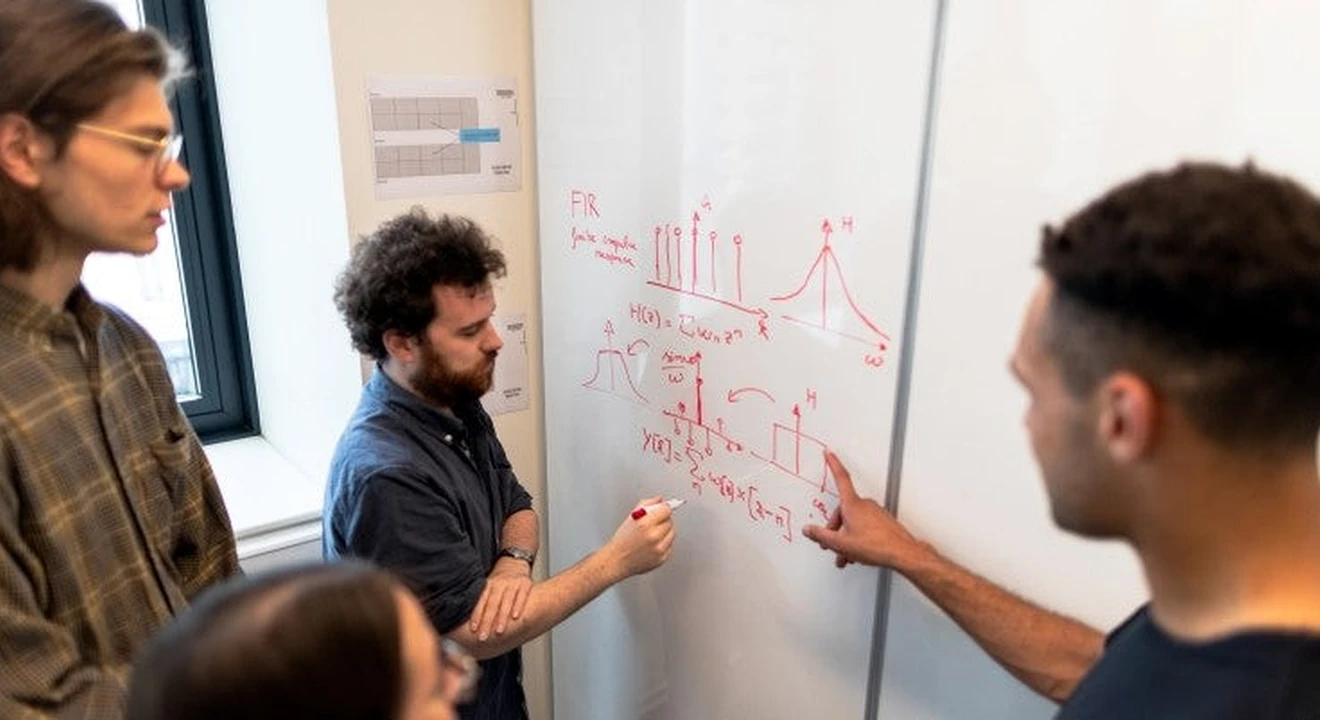Google site reliability engineer (SRE) interviews are unique and complex. The interview process is rigorous, with challenging, company-specific questions across four or more rounds.
To succeed, you’ll need strong coding skills for LeetCode-style problems, a solid understanding of Linux internals, and the ability to design reliable systems and troubleshoot issues when they arise.
Sounds difficult? We're here to help. Use this guide to structure your prep, and when you want to dive deeper, simply follow our links to free learning materials.
Below, you’ll find a detailed breakdown of the interview process, some real sample questions from Glassdoor, and expert tips – everything you need to walk into each round with confidence.
Here's an overview of what we'll cover:
Let’s get started.
Click here to practice 1-on-1 with Google SRE ex-interviewers
1. Google site reliability engineer role and salary ↑
Before we cover your Google SRE interviews, let’s first look at the role itself.
1.1 What does a Google site reliability engineer do?
Site reliability engineers (SREs) at Google ensure that critical systems, especially Google Cloud services, remain reliable, efficient, and scalable. In this role, you’ll apply software engineering principles to operations, with a strong focus on automation and long-term reliability.
Your main responsibilities will include building tools to reduce manual work, managing system capacity, monitoring service health, and responding to production incidents. You’ll also conduct root cause analysis and implement long-term fixes to prevent recurrence.
In addition, you’ll collaborate closely with product and infrastructure teams to design services that are resilient and scalable from the start. These efforts help ensure Google delivers fast, reliable services to billions of users.
What does Google look for in a site reliability engineer?
An analysis of Google’s SRE job postings shows that the company typically looks for a strong technical foundation, hands-on coding experience, and familiarity with large-scale systems.
For mid-level to senior roles, candidates usually need 5–7 years of experience writing code in one or more programming languages such as Python, C++, Java, or Go. They’re also expected to have 4 or more years of experience leading projects or providing technical direction, and 3+ years designing, analyzing, or troubleshooting distributed systems.
Entry-level roles, on the other hand, generally require 1–2 years of experience with programming and algorithms, gained through academic work, internships, or open-source contributions.
Across all levels, Google values strong problem-solving skills, the ability to automate operational tasks, and clear communication in a distributed team environment. A master’s degree is considered a plus, but is not required for this position.
1.2 How much does a Google site reliability engineer make?
Based on Glassdoor data computations, the average base pay for a Site Reliability Engineer role at Google US is 77% higher than the estimated average base pay of a Site Reliability Engineer in the US.
Below you can see the average salary and compensation of the different SRE levels at Google US, as of September 2025, based on Levels.fyi.

Ultimately, how well you perform in your interviews will determine what you’ll be offered. That’s why hiring one of our ex-Google interview coaches can provide such a significant return on investment.
And remember, compensation packages are always negotiable, even at Google.
So, if you do get an offer, don’t be afraid to ask for more. If you need help negotiating, use our guide to Google offer negotiations and consider booking one of our salary negotiation coaches to get expert advice.
2. Google site reliability engineer Interview process and timeline↑
2.1 What interviews to expect
What's the interview process and timeline at Google for the site reliability engineer position? It usually takes three months or even more, and follows the steps below.
- Resume screen
- Online assessment (in some cases)
- Phone interview (1-2 interviews, 45-60 min each)
- Onsite interviews (4-5 interviews, 45-60 min each)
Let’s take a look at these steps in more detail.
2.1.1 Resume screen
First, recruiters will look at your resume and assess if your experience matches the open position. This is the most competitive step in the process, as most candidates do not make it past this stage.
Check out our free Google resume guide with examples for tips on writing yours.
If you’re looking for expert feedback on your resume, you can get insights from our team of ex-FAANG recruiters, who will cover what achievements to focus on (or ignore), how to fine-tune your bullet points, and more.
If you do have a connection to someone at Google, it can be really helpful to get an employee referral to the internal recruiting team. This may increase your chances of getting into the interview process.
2.1.2 Online assessment (in some cases)
Some candidates will receive an invitation for an online test before moving on to the first-round calls. These are more common for internships, entry-level candidates applying through the Google SRE early career campus interview, and other junior positions. However, they may appear in experienced positions as well.
The test is a coding assessment that evaluates your ability to use common data structures and algorithms (DSA). You can check out our guide on Google’s coding assessment, which is designed for software engineers but can still be useful for SRE candidates.
2.1.3 Phone interviews
The next step includes one or two calls with Google interviewers via Google Meet, which last 45-60 minutes each.
These phone interviews are with a Google engineer. You will probably be given one or more coding problems to work through, and you may also be asked questions that test your knowledge on Linux internals or be asked to troubleshoot a process in Linux.
You’ll typically be doing your coding using a shared Google Doc, where you’re unable to run the code or see any static analysis. While most candidates choose to code in Python, you can choose to code in Java or C++, whichever you prefer.
2.1.4 Onsite interviews
The final stage in the Google site reliability engineer interview process is the final onsite or virtual interview loop. This will include:
- 2-4 coding interviews
- 1 behavioral interview
- 1 large systems design interview (some candidates)
We’ll be getting into greater detail on each of these types of questions, including examples, in Section 3.
The interviews will be one-on-ones with a mix of people from the team you’re applying to join, including site reliability engineers, software engineers, hiring managers, etc.
If you are physically onsite, one or more of the engineers will probably accompany you for lunch in the Google canteen. This isn't technically an interview, but you should still try to make a good impression.
For your coding and system design interviews, you'll either be drawing out systems and code on a physical whiteboard or using a Chromebook plugged into a projector screen. We recommend you practice using these materials at home before going in for the interviews.
2.2 What exactly is Google looking for?
At the end of each interview, including the initial phone screens, each interviewer will grade your performance using a standardized feedback form that summarizes the attributes Google looks for in a candidate.
That form is constantly evolving, but we have listed the main components we know of at the time of writing this article below.
A) Questions asked
In the first section of the form, the interviewer fills in the questions they asked you. Future interviewers will take a look at this to make sure that you don't get asked the same questions twice.
B) Attribute scoring
Each interviewer will also assess you on the four main attributes Google looks for when hiring:
- General cognitive ability (GCA). Here, your interviewer will try to understand how you solve hard problems and how you learn and adapt to ambiguous situations. For more information, take a look at our guide to the Google GCA interview.
- Role-related knowledge and experience (RRK/RRKE). The company wants to make sure that you have the right experience, domain expertise, and competencies for the position you're applying for. For more information, take a look at our guide to the Google RRK interview.
- Leadership. Google is looking for candidates with “emergent leadership,” i.e., a site reliability engineer who’ll step up and lead at different times in the lifecycle of a project when their skills are needed.
- Googleyness (i.e., culture fit). The company wants to make sure Google is the right environment for you. Your interviewer will check whether you naturally exhibit the company's values, including comfort with ambiguity, a bias to action, and a collaborative nature. For more information, take a look at our guide to Googleyness and leadership interviews.
Depending on the exact job you're applying for, these attributes might be broken down further. But the total number of attributes does not usually exceed six or seven.
In this middle section, Google's interviewers typically document your answers to each question in detail and give you a score for each of the attributes above (e.g., "Poor," "Mixed," "Good," "Excellent").
C) Final recommendation
Finally, interviewers will write a summary of your performance and provide an overall recommendation on whether they think Google should be hiring you or not (e.g., "Strong no hire," "No hire," "Leaning no hire," "Leaning hire," "Hire," "Strong hire").
2.3 What happens behind the scenes
If things go well at your onsite interviews, here's what the final part of the process looks like:
- Interviewers submit feedback
- Hiring committee recommendation
- Team matching
- Senior leader and compensation committee review
- Final executive review (only for senior roles)
- You get an offer
After your onsite interview, your interviewers will all submit their feedback, usually within two to three days. This feedback will then be reviewed by a hiring committee, along with your resume, internal referrals, and any past work you have submitted.
At this stage, the hiring committee will make a recommendation on whether Google should hire you or not.
If the hiring committee rules in your favor, you'll usually start your team-matching process. In other words, you'll talk to hiring managers, and one or several of them will need to be willing to add you to their team for you to get an offer from the company.
In parallel, the hiring committee recommendation will be reviewed and validated by a senior manager and a compensation committee. They will then decide how much money you are offered.
Finally, if you are interviewing for a senior role, a senior Google executive will review a summary of your candidacy and compensation before the offer is sent to you.
As you've probably gathered by now, Google goes to great lengths to avoid hiring the wrong candidates.
This hiring process with multiple levels of validations helps them scale their teams while maintaining a high caliber of employees. It also means that the typical process can spread over many weeks and sometimes months.
3. Example Google site reliability engineer interview questions ↑
Now that you've learned how Google’s interview process works, let's go into detail on what kind of questions you can expect to face.
Most site reliability engineer candidates will get questions across five different categories:
- Coding
- Linux internals
- Troubleshooting
- Non-abstract large system design (NALSD)
- Googleyness & leadership (behavioral)
Let's dive into each category. For each, we've listed real questions reported by Google SRE interview candidates on Glassdoor.
3.1 Coding interview questions ↑
Google runs large services that are constantly getting new features, and SREs are responsible for writing the software that makes this possible through automation.
Therefore, interviewers will test your problem-solving skills and ability to think in a structured way using code. They'll want you to have strong knowledge of common data structures and algorithms and to be able to code bug-free.
You can generally expect LeetCode medium to hard questions with emphasis on algorithmic thinking and problem-solving. Some candidates report that graph traversal techniques, particularly Breadth-First Search (BFS) and Depth-First Search (DFS), come up often. These approaches are especially relevant in problems dealing with trees, graphs, shortest paths, backtracking, and connectivity.
The coding problems you're given will have a brute-force solution to them. Your first aim will be to reach the brute force solution, and then the rest of the interview is usually taken up by trying to find a more efficient solution. The interviewer will give you hints to point you towards the right track.
Let's take a look at some example questions.
Example Google site reliability engineer interview questions: Coding
- How would you implement a sorted hash table in C? (Solution)
- Design a data structure to read a stream of temperatures and find the max within the past 24 hours.
- Given an array of integers find indices I < j < k such that a[I] < a[j] < a[k] (Solution)
- Given a matrix (not necessarily a square), a starting position on the matrix, and a set of valid moves, count the total number of paths from the starting position (Solution)
- Given a collection of ads (data structure given), what is the mean and median of the array? (Solution)
- Find the height of a Binary Search Tree; How many leaf levels would a tree with X amount of nodes contain? (Solution)
- Given a data structure of rows (source, ratio, destination), find the value of conversion for a given source to a given destination. Example (EUR, 1.23, GBP) (Solution)
- Add two numbers given as strings and return the resulting number as a string without leading zeros (Solution)
- Given a filesystem where each item is either a folder (listing child IDs) or a file (with name and size), how would you compute the size of a specified folder?
- Shuffle an array so that no element remains in its original position (Solution)
- What is the time complexity to complete the operation 'x in l' if l is a list?
- Implement a data structure that supports the operations flipBits(ith bit, # of bits) and getBit(ith bit), billions of possible bits, <= O(n log n) preferably.
- Make a class that, given a keyboard configuration and the size of the keyboard, returns the key for given coordinates (creation includes a list of vectors with the keys).
- Using Bash and cron, write a script that runs automatically on the last Friday of every month.
- Write a program in C that implements a shell's facilities for (1) initiating a background process, and (2) command line pipes.
Finally, we recommend reading our guide on Google coding interviews and how to answer coding interview questions. You can also practice with this list of coding interview examples in addition to those listed above.
3.2 Linux internals ↑
For a Google SRE-SE role, you won’t even make it past the phone screen without a deep understanding of Linux internals. Whereas at the Meta production engineer interview process, you can get by, at least until the onsite, with only a superficial knowledge of Linux.
Having a strong knowledge of Linux systems is crucial in Google SRE interviews because it forms the foundation for managing processes, memory, file systems, and networking at scale. This depth of expertise allows SREs to diagnose and resolve complex issues in large, distributed environments.
You’ll be expected to be able to explain aspects of processes, system calls, file systems, context switching, kernel resource management, kernel network stack, how the shell works and why, and client-server protocols.
Below, the first seven example questions are from Google SRE interview reports. The rest are from Meta interviews, but are still the kind of thing you're likely to be asked.
Example Google site reliability engineer interview questions: Unix/Linux
- What is a zombie process?
- What's the difference between a hard and soft link in Linux?
- Which system call’s return value is not zero, although it ended successfully?
- How does a garbage collector work?
- What's the difference between TCP and UDP?
- What is the function of inodes in a Linux filesystem?
- How to terminate a running process?
- How do you load a Linux kernel? (Solution)
- What's a signal, and how is it handled by the kernel?
- What is the swap area, regarding memory?
- What is the default signal that is generated when sending a kill command to a process in Linux?
- What happens in Linux, on a kernel level, when you type in ls -l? (Solution)
3.3 Troubleshooting questions ↑
As a site reliability engineer, troubleshooting will be one of the main aspects of your role. If a system fails, it can cost Google millions of dollars per hour. It's your job to make sure that doesn't happen or, if it does, fix it as soon as possible.
You’ll likely get a hypothetical problem around systems troubleshooting, either in the phone or onsite interview. Your objective is to effectively and systematically find the root cause.
You should expect questions around networking concepts, such as connectivity checks, DNS resolution, port conflicts, and routing.
Example Google site reliability engineer interview questions: Troubleshooting
- How would you troubleshoot network packets reaching some parts of the network and not others?
- You’re on-call for the Shakespeare search service and receive an alert, Shakespeare-BlackboxProbe_SearchFailure: your black-box monitoring hasn’t been able to find search results for “the forms of things unknown” for the past five minutes. What do you do?
- Debug a slow web server, using any tool available
3.4 Non-Abstract Large Systems Design (NALSD) questions ↑
In the design of any large system at Google, at least one SRE will be involved to analyze potential risks and failures in the system under design. Therefore, you'll need to demonstrate that you're capable of understanding and predicting the behavior of complex systems.
This is where the large systems design interview comes in. Google specifies that it's "non-abstract" because they want you to show that you can design something that will translate in the real world.
In most companies, system design interviews stay at a higher level and focus on architecture trade-offs. At Google, you’re expected to go further by demonstrating how your design would behave in practice. This includes showing how it scales, where it might fail, and how you would mitigate those failures.
You'll be given a complex, ambiguous problem, and you'll have to come up with a solution for it that works technically and is scalable.
Site reliability engineer interview questions: System design
- Design a "snakes" game
- Design Google AdWords (walk-through solution)
- Design a thumbnail service
- Design a system for copying a file to remote servers
- Design a chat system for 10 million users
Check out our guide to the 11 most-asked system design interview questions for more practice questions, sample answers, and tips for answering these questions.
3.5 Googleyness and leadership questions ↑
Beyond possessing excellent technical skills, Google site reliability engineers must have the soft skills necessary to work in cross-functional teams and contribute positively to the company's culture. SRE candidates applying for management positions must also prove that they have what it takes to lead teams.
Google interviewers, therefore, use behavioral and hypothetical questions to test for "Googleyness" and "leadership".
SRE candidates tend to face fewer behavioral questions at Google compared to candidates interviewing for other roles. But as a minimum, you'll at least face some "culture fit" type questions that test your "Googleyness", such as "Why Google?" and "Tell me about yourself."
Example Google site reliability engineer interview questions: Googleyness and leadership
- Why Google?
- Why do you want to leave your current job?
- Tell me about a recent/interesting project you worked on
- Tell me about a time you had to resolve a conflict in a team/group.
- What is your favorite Google product?
Check out our guides on Googleyness & leadership and Google behavioral interview questions to learn more.
4. Google site reliability engineer interviewing tips ↑
You might be a fantastic site reliability engineer, but unfortunately, that won’t necessarily be enough to ace your interviews at Google. Interviewing is a skill in itself that you need to learn.
Let’s look at some key tips to make sure you approach your Google SRE interviews in the right way.
4.1 Ask clarifying questions
More than any other FAANG company, Google will put you in situations that test how comfortable you are with ambiguity. Interviewers will want to talk about your thought process, about the options available to you, and the reasons for making different technical choices.
So, be sure to ask clarifying questions and understand the problem before diving in. Going straight to problem-solving without asking questions is a red flag when answering Google SRE interview questions.
4.2 Be conversational
Google wants to know if you have excellent communication skills. So make sure you approach the interview like a conversation.
The best way to approach an interview is to treat it like you’re discussing the problem with a colleague.
Additionally, Google will be testing your ability to communicate highly technical concepts to non-technical people. Be sure to brush up on your basics and practice interpreting them in a way that’s clear and easy for everyone to understand.
4.3 Think out loud
You need to walk your interviewer through your thought process before you actually start coding.
Google recommends that you talk even while coding, as they want to know how you think. Your interviewer may also give you hints about whether you’re on the right track or not, so listen carefully and be prepared to pivot if needed.
4.4 State and check assumptions
You need to explicitly state assumptions, explain why you’re making them, and check with your interviewer to see if those assumptions are reasonable.
4.5 Be honest and authentic
Be genuine in your responses. Google interviewers appreciate authenticity and honesty.
If you faced challenges or setbacks, discuss how you improved and learned from them. If you’re asked about your failures, don’t disguise them as strengths.
Google values intellectual humility; admit where you went wrong and what you were able to learn from the failure.
4.6 Practice system design
Even more than with coding problems, answering system design questions is a skill in itself. You should start with a high-level design and then drill down on the system component of the design. Use our Google system design interview guide to prepare.
4.7 Center on Googleyness
Familiarize yourself with Google’s core values and align your behavioral responses with them.
Google values certain attributes such as comfort with ambiguity, collaborative nature, bias for action, and focus on the user.
4.8 Brute force, then iterate
When coding, don’t necessarily go for the perfect solution straight away. Google recommends that you first try and find a solution that works, then iterate to refine your answer.
4.9 Get comfortable with coding on various mediums
Google now typically asks interviewees to code in a Google Doc. But this can vary; it could be on a physical whiteboard or a virtual one. Check with your recruiter what it will be and practice it a lot.
The key is to keep your code organized so your interviewer won’t have difficulty understanding what you’ve written.
5. How to prepare↑
Now that you know what questions to expect, let's look at how best to prepare. Below, we've listed four steps that you can follow to prepare as efficiently as possible.
5.1 Learn about Google’s culture
This is a key step that many candidates fail to take. Before investing your time in preparing for an intense and lengthy interview process like Google’s, you should make sure that it is the right company for you.
Because Google is a well-known and powerful company, many assume that they should apply there without considering the position more carefully. However, prestige alone does not mean that the job is a good fit for everyone.
If you know engineers who work at or used to work at Google, reach out to them to find out more about the culture and daily tasks. We also recommend you do your research, starting with the following resources:
- Google's mission statement (by Google)
- Google's values (by Google)
- Google’s company blog (by Google)
- Google strategy teardown (by CBS Insights, old but good)
- Being a Google SRE (by Google Careers)
- Google’s (Alphabet’s) Organizational Culture & Its Traits (by Panmore Institute)
You should also watch this short video, which gives an introduction to the SRE team at Google.
5.2 Practice by yourself
Once you’ve learned more about Google, study up on the types of questions that you’ll be asked during the interviews. There's plenty of great resources out there (plus more listed on this Reddit thread), many of which we've used in writing this article:
- Resources from Google:
- For coding questions:
- Use our Coding interview prep guide as your one-stop shop to guide your prep process. It has a 7-step preparation plan and links to the best resources.
- You'll also want to do a lot of practice on Leetcode or similar
- To brush up on your technical knowledge of Linux internals, networking, troubleshooting, etc.
- This great SRE resource on GitHub
- 'Linux Performance Analysis in 60,000 Milliseconds' is also highly recommended
- Google SRE team's troubleshooting workbook
- For the large system design interview:
- For Googleyness and leadership questions:
- See common behavioral questions and answers in our guide to Google interview questions
- Other very useful resources:
Once you’re in command of the different subject matters, you’ll want to practice answering questions. But by yourself, you can’t simulate thinking on your feet or the pressure of performing in front of a stranger. Plus, there are no unexpected follow-up questions and no feedback.
5.3 Practice with peers
If you have friends or peers who can do mock interviews with you, that's an option worth trying. It’s free, but be warned, you may come up against the following problems:
- It’s hard to know if the feedback you get is accurate
- They’re unlikely to have insider knowledge of interviews at your target company
- On peer platforms, people often waste your time by not showing up
For those reasons, many candidates skip peer mock interviews and go straight to mock
interviews with an expert.
5.4 Practice with experienced SRE interviewers
In our experience, practicing real interviews with experts who can give you company-specific feedback makes a huge difference.
Find a Google site reliability engineer interview coach so you can:
- Test yourself under real interview conditions
- Get accurate feedback from a real expert
- Build your confidence
- Get company-specific insights
- Learn how to tell the right stories better
- Save time by focusing your preparation
Landing a job at a big tech company often results in a $50,000 per year or more increase in total compensation. In our experience, three or four coaching sessions worth ~$500 make a significant difference in your ability to land the job. That’s an ROI of 100x!
Click here to book mock interviews with experienced Google SRE interviewers















